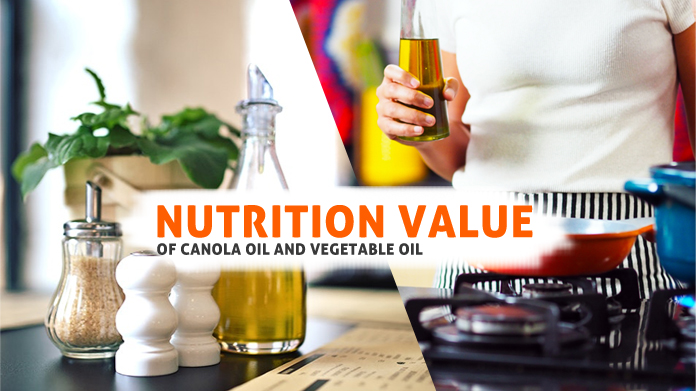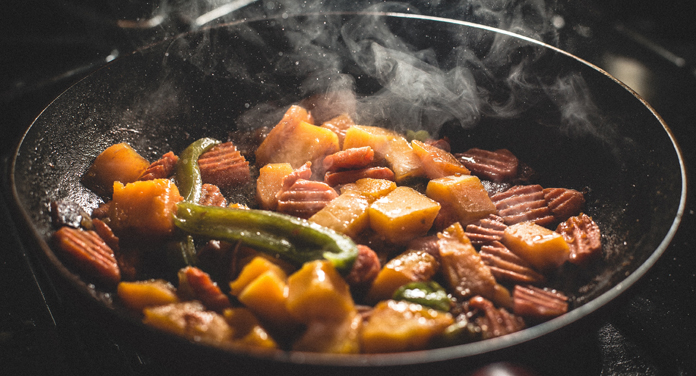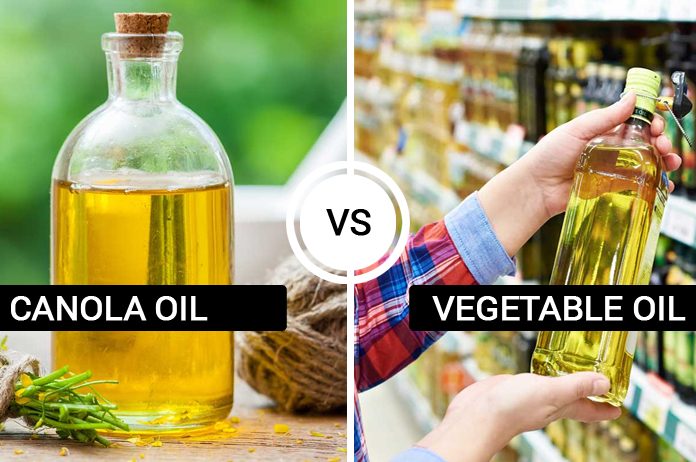Canola oil and vegetable oil have a lot of similarities. When they are kept in side-by-side bottles in the kitchen, you may even get confused identifying which one is canola oil or vegetable oil.
These workhouse oils are light yellow in colour, neutral in flavour, affordably priced, and have a high level of smoke points, making them ideal for frying.
Oil is essential for cooking, and either of them can be used regularly in cooking various dishes. But do we know which oil is the healthiest option for us and which are best for different dishes and cooking style?
We use them for various purposes like frying chicken and deep-fried potatoes, baking a cake, delicious stir-fry, noodles, and gravies. Vegetable oil can be used in place of canola oil and vice versa.
If you taste both the oils, you may feel a slight difference in taste, but after cooking or when the final dish is ready, you may not find any difference in
Canola oil and vegetable oil are both associated with plant-based oils. The former comes from a hybrid of rapeseeds, and the latter is usually from soybean, palm plants, sunflower and a variety of other plants.
Even we do not feel the changes in them; the nutrition varies in their individual fat composition. Canola oil vs vegetable oil will help us know which better option to stick to as it is a common question.
Remember the three things you should consider while buying the right oil for your home.
- The smoking point which is the temperature the oil starts to break and slowly begins to become unhealthier
- The type of fat or the fat composition the oil contains
- Flavor for taste
Origins
The main difference between vegetable and canola oils is their kind and how they are derived. One major drawback canola oil has is that it is not naturally produced. It comes from the hybrid rapeseed plant. It goes through several long and complex industrial processes before it is finally ready to be consumed.
As they are not produced naturally but rather in an artificial method, the genetically modified plants are often sprayed with several chemicals that may be harmful to humans.
On the other hand, vegetable oil is more natural and comprises plant-based oils extracted from various sources, mostly soybeans, peanut, corn, and safflower. This is plant-based more in subjective terms. They are also sprayed with pesticides but are comparatively lesser than those for canola oil. Though the name is that of vegetable oil, it does not contain any vegetable constitute.
Nutrition
Canola oil has more quantities of fats that are good and essential than vegetable oils. Oils generally contain high levels of fats, and if consumed in moderate quantity, they can prove to be healthy instead

Trans and saturated fat can be harmful to health, increasing the level of cholesterols and, eventually, the risks associated with heart diseases.
What is good is that both canola oil and vegetable oil carry essential fatty acids instead, which are monounsaturated and polyunsaturated fatty acids, both help to lessen the swelling in the body and are less prone to causing heart diseases. But vegetable oil contains more saturated fat than canola oil.
Canola oil constitutes more omega 6 and omega 3 fatty acids than vegetable oil in the perfect ratio. These types of fats promote good heart health, skin, hair and even mood hormones.
The Omega fatty acids present in vegetable oils are lower and of poorer quality than in canola oils. Canola oil has one of the lowest contents of saturated fats among all the oils available in the market and that we usually consume.
Vegetable oil has more harmful contents of saturated fat than compared to canola oil. So, this proves to be one of the primary reasons why canola oil is healthier when it comes to health-related matters, even though they are artificially formed.
Smoking Points
Smoking point is a significant feature of any oil and one of the critical factors to check before purchasing any oil. As mentioned earlier, this smoking point is when the oil starts to release smoke and toxins, becomes unstable and turns darker.
At this point, the temperature rises, turning the oil that unhealthier. The smoke points of both canola oil and vegetable oil vary from each other, and therefore their cooking uses also differ.
Vegetable oil is more appropriate for cooking in average heat or that involves long hours of frying. On the other hand, Canola oil is better for medium-high cooking required for stir-fries, curries, and baking.
Canola oil has a smoke point of higher ranges from 375 to 450 degrees, whereas soybean-based vegetable oils have a smoking point of 20 to 30 degrees lesser than that of canola oil.
Vegetable oil has an average smoking point that is neither very high nor low, which means that it cannot allow the submission to high temperatures for too long, unlike canola oil.
So it is recommended to use for light cooking purposes like baking and sautés that can be prepared in low heat.

Taste
Canola oil has a neutral and mild flavour, making it the best choice in spicy and flavoursome dishes.
Canola oil can be great for light frying purposes or for preparing delicate or more elegant dishes like chicken and seafood.
Canola oil is the best option for grilling vegetables and is better suited for dips, sauces, and salad dressings than vegetable oil.
Vegetable oil also has a neutral taste and can enhance food flavours because of its thicker fat-based concentration. Because of this, it is perfect for fried potatoes or tempura fish.
This oil is also suitable for denser dishes like preparations with meat, wholesome lasagna, vegetables, and spaghetti.
Soybean-based or safflower-based vegetable oils are more suitable for baking because of their lower taste and thicker concentration.
Canola oil is also relatively low in
Canola oil is considered healthier due to its nutrition content than vegetable oil. It is instead treated as a healthier substitute to typically conventional vegetable oil.
Recently, however, many dieticians have been asserting that it is not so healthy either due to the detailed production techniques required for producing canola oil.
Canola oil has been criticized mainly because of the artificial processing it takes to be obtained from the rapeseed pants and the otherwise harmful toxin compounds that are sprayed during the period of its processing and formation.
Canola oil requires intricate processing that involves machines using excess high-level heat to get the oil, which can be
So, if we focus on canola oil vs vegetable oil, we see none are healthy for consumption. However, canola oil is not as bad as vegetable oil but is still the healthiest option. Other great healthy options of oil to be used in cooking are avocado oil, extra virgin olive oil, and coconut oil.






